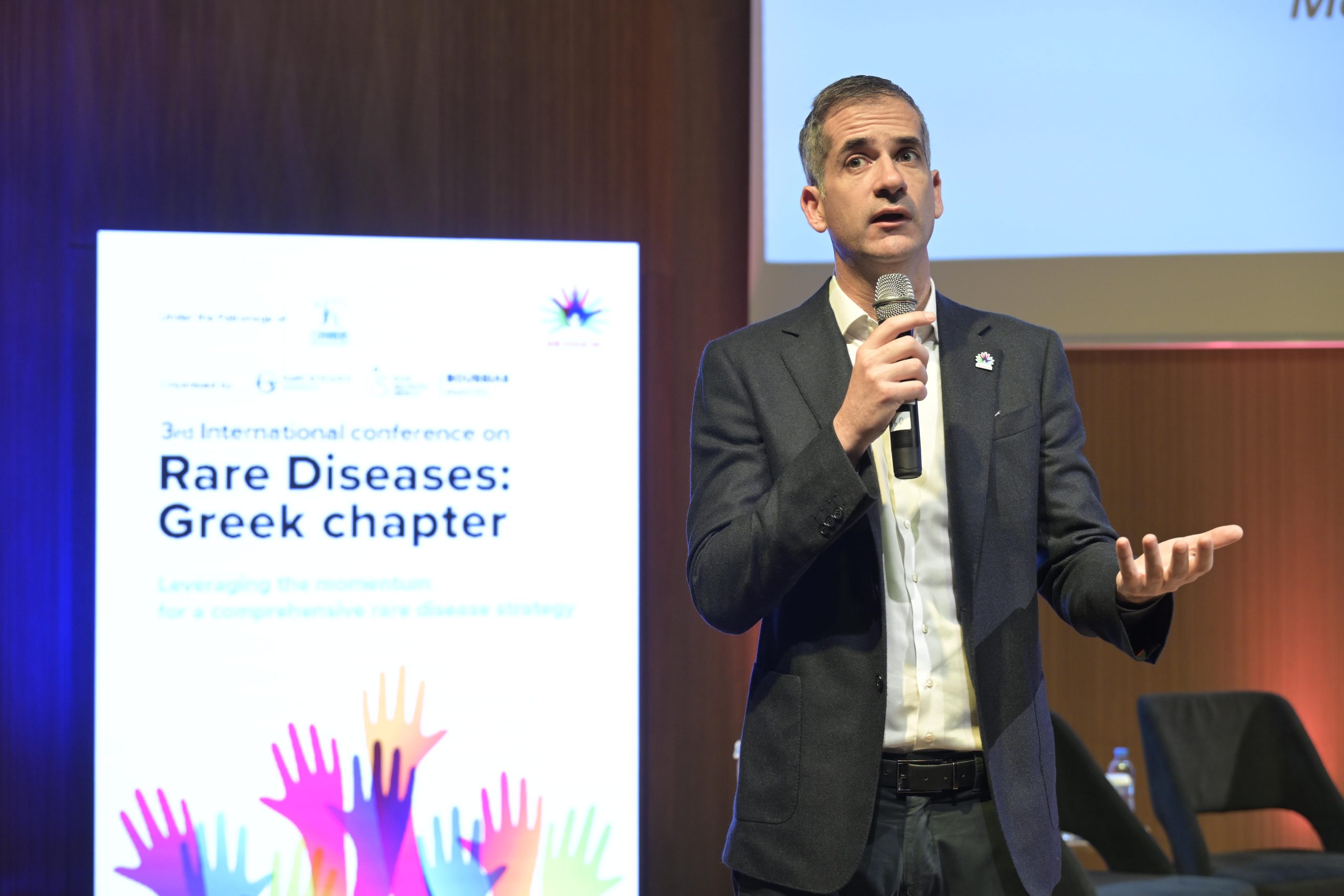Athens February 21, 2024 – In the context of this year’s World Rare Disease Day, which is celebrated every year on the last day of February, Rare Diseases Greece and BOUSSIAS Events, are organizing the International Congress on Rare Diseases and Orphan Drugs. The conference will take place on February 29 (Hybrid) at Technopolis City of Athens Gasholder 1 – Auditorium “Miltiadis Evert”, & March 1 (Digital), 2024 under the patronage of the European Parliament, the auspices of the Hellenic Ministry of Health and the City of Athens, with the support of EFPIA, EUCOPE, Europa Bio, EJPRD, Greek Patients’ Association (GPA), the PhARMA Innovation Forum (PIF), the Panhellenic Association of Pharmaceutical Companies (PEF) and the Hellenic Association of Pharmaceutical Companies (SFEE).
Following previous years’ success with a lineup of 57 distinguished Greek and foreign speakers and more than 450 participants from 30 countries all over the world, we aspire to continue even more dynamically this year focusing our Special Theme on: “Navigating the Uncharted: Advancements, Collaborations, and Hope in Rare Diseases” and gather all stakeholders in the rare disease community – patient representatives, policy makers, clinicians, researchers, industry representatives, payers, and regulators – in order to promote policy changes to help build a better pathway from Diagnosis to Access for Rare Diseases. Utilizing the experience and knowledge of international partners, the conference will open the dialogue in Greece presenting the current political developments in Europe and the drawing up of a National Strategy for Rare Diseases with the ultimate goal of creating and implementing the National Action Plan for Rare Diseases within 2024.
The Development and Implementation of a Long-Term National Strategy for Rare Diseases is necessary not only for the Health System and patients but also for the Economy and Society as a whole. Such a strategy enables prevention, early diagnosis, longer duration and better quality of life for the patient, taking into account the needs of his caregivers, with lower costs for the National Health System and increased revenue for the Economy. Greece and the Health System must face the challenges, but also take advantage of the opportunities and possibilities presented.
The main hosts of the conference will be Dimitrios Athanasiou, President Rare Diseases Greece, EMA PCWP Member, GPA WDO, 95, Board Member & Vasilis Karatzias, VP Rare Diseases Greece, President, Hellenic Friedreich’s Ataxia Association, Director of the Office of Legal Advisers, NATO Rapid Deployable Corps.
Day 1 of the Conference will be held in Greek with simultaneous translation into English and will focus on the needs of Rare Patients in Greece. Among others, we are proud to announce the presence of Adonis Georgiadis, Minister of Health, Hellenic Ministry of Health, Kostas Skrekas, Minister of Development, Irene Agapidaki, Alternate Minister of Health, Hellenic Ministry of Health, Nikos Milapidis, Secretary General for Social Security, Ministry of Labor and Social Security, Pavlina Karasiotou, Secretary General for Fiscal Policy, Ministry of Economy and Finance, Hellenic Republic, Lilian Venetia Vildiridis, Secretary General of Health Services, Hellenic Ministry of Health, Stelios Kympouropoulos, Psychiatrist, MEP, Evangelos Manolopoulos, President of the National Organization for Medicines (EOF), Professor of Pharmacology, School of Medicine, Democritus University of Thrace, Dr. Nandia Gogozotou, NE President at EOPYY, President of the Drug Price Negotiation Committee, Dr. Pantelis Messaropoulos, President of the Board of Directors of the Hellenic Institute of DRG (KE.T.E.K.N.Y.) and representatives of Patient Associations, the Pharmaceutical Industry and main representatives of the agencies and organizations dealing with Rare Diseases with the ultimate goal of creating and implementing the National Action Plan for Rare Diseases within 2024.
Day 2 will focus on latest developments on the international scene; important keynote speakers, including world-renowned experts, will discuss cutting-edge technologies, innovative funding models and pharmaceutical legislation reshaping the rare disease landscape. Among others, we are honored to welcome Steffen Thirstrup, Chief Medical Officer of EMA, Affiliate Professor at the University of Copenhagen, former Head of Division for Medicines Assessment and Clinical Trials at the Danish Health and Medicines Authority, former CHMP EMA Member, Violeta Stoyanova-Beninska, Chair of Committee for Orphan Medicinal Products at European Medicines Agency (EMA), Division Europe and International Affairs at MEB, Vice Chair of Regulatory Science Committee of IRDiRC, Daria Julkowska, EJP RD Coordinator, Assistant Director, Thematic Institute of Genetics, Genomics & Bioinformatics, INSERM, France, Magda Chlebus, Executive Director Science Policy and Regulatory Affairs, European Federation of Pharmaceutical Industries and Associations (EFPIA), Dr. Patrice Verpillat, Head of Real World Evidence (TDA-RWE), Data Analytics and Methods Task Force (TDA), European Medicines Agency (EMA), Anja Schiel, Special Adviser, Lead Methodologist in Regulatory and Pharmacoeconomic Statistics, NoMA, Teamleader international HTA (iHTA, NoMA), Vice-Chair CSCQ JSC (EUnetHTA21), Member Scientific Advice Working Party (SAWP), EMA, Member Methodology Working Party (MWP), Alexander Natz, Secretary General, European Confederation of Pharmaceutical Entrepreneurs (EUCOPE), Tomasz (Tomek) Grybek, Associate Director Market Access EFPIA, Matteo Scarabelli, Associate Director Market Access, European Federation of Pharmaceutical Industries and Associations (EFPIA), Adrien Samson, Healthcare Policy Senior Manager, EuropaBio, Valentina Bottarelli, Public Affairs Director & Head of European Advocacy, EURORDIS-Rare Diseases Europe and Maurizio Scarpa, Paediatrician, Professor of Paediatrics, Dept. of Women’s and Children’s Health, University of Padova, Italy Director, Coordinating Center for Rare Diseases, Azienda Sanitaria Universitaria Friuli Centrale, Udine, Italy, Founder and President of Brains for Brain Foundation, ERICA Board/ MetabERN Coordinator.
The conference is expected to be a central point of interest for all those involved with rare diseases throughout the world, in Europe and in Greece, both at the institutional and academic level on key topics of discussion during the two-day Conference such as:
- The European Policy Landscape on Rare Diseases
- New Regulatory Models for Orphan Drugs
- Access and Reimbursement Strategies for Orphan Drugs in Europe
- The presentation of important initiatives (SRIA EJPRD, S4C, Erica, Together4Rare, Transform, Moonshot)
- European Reference Centers (ERNs) in the National Health Systems and their Research Potential
- Research and participation in clinical trials as part of patient care
- RWE for informed and impactful Decision Making
- The Strategic Planning for Rare Diseases in Greece
- The Patient Registry and the Greek National Action Plan for Rare Diseases
- Navigating Access Pathways for Orphan Drugs in Greece
Don’t miss this unique opportunity to be part of a transformative event that is paving the way for advancements, collaborations, and hope in the realm of rare diseases.
More on Rare Diseases:
There are currently estimated to be around 6,000-8,000 rare diseases, affecting around 30 million European citizens, up to 6% of the total population of the European Union (EU) at some point in their lives, and 300 million people worldwide. In Greece, it is estimated that rare diseases affect 5% to 7% of the country’s population. Taking into account family members and their caregivers, there are more than 1,500,000 people in our country who are directly or indirectly affected by rare diseases.
The lack of specific health policies for rare diseases and insufficient information and awareness lead to late and incorrect diagnoses and difficult access to care. This leads to increased physical, psychological and mental effects, inadequate treatments, as well as a loss of trust in the health care system. However, some rare diseases can be compatible with a quality lifestyle if diagnosed early and treated appropriately. Improving health care delivery is a major challenge for public health due to the lack of epidemiological data, data that assess and evaluate the consequences of these pathologies on the quality of life of patients and their families as well as the existing needs in the areas of diagnosis and treatment.
For more information:
Boussias Events: Natalia Toumpanaki, T: +30 6947936708 | E: ntoubanaki@boussias.com
Rare Diseases Greece (RDG): Dimitrios Athanasiou, T: +30 6944604292 | E: dathax@gmail.com



